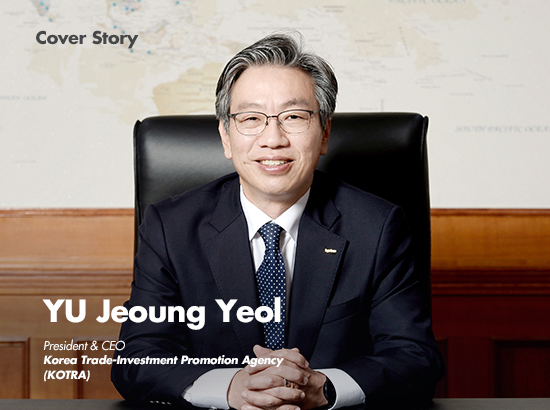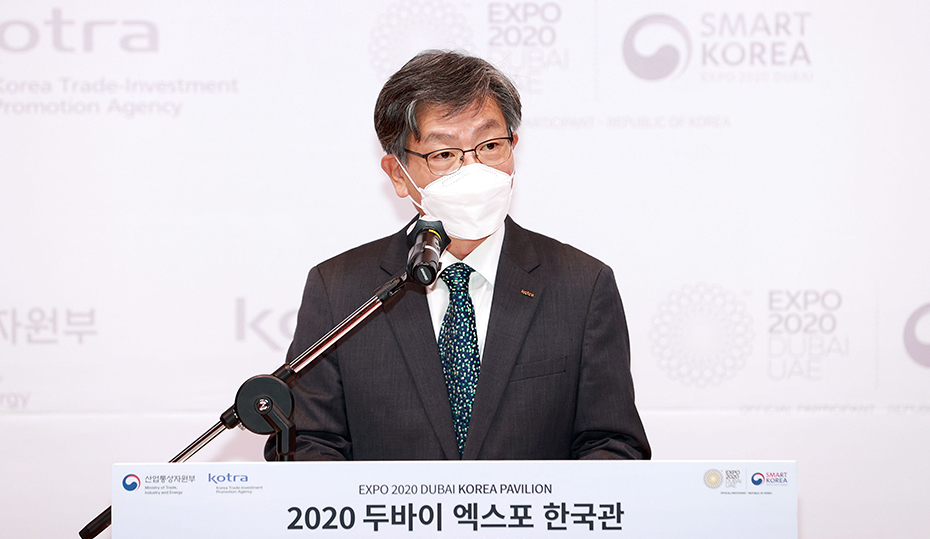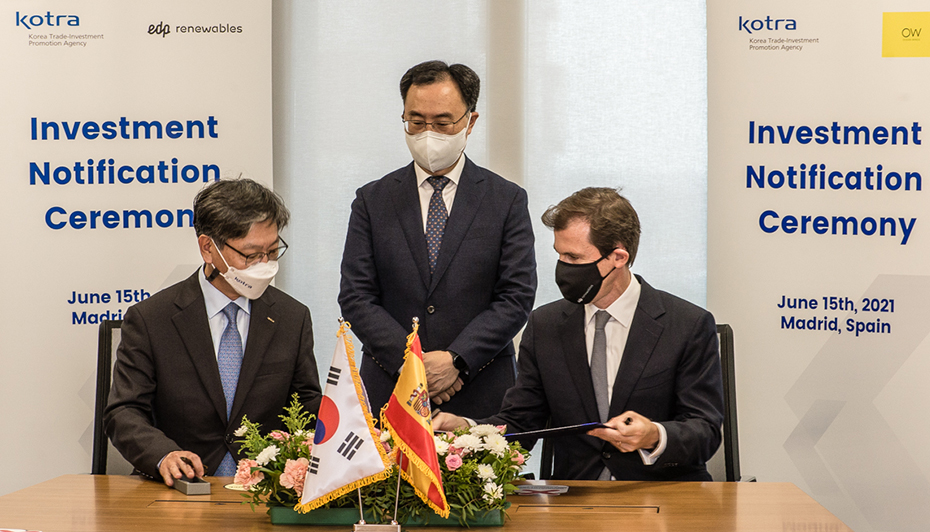
Invest Korea interviews YU Jeoung Yeol, President & CEO of the Korea Trade-Investment Promotion Agency (KOTRA), to learn more about Korea's economic status and the advantages of investing here.
Please tell us how you feel about being newly appointed as president and CEO of KOTRA.
I have carried out various tasks such as establishing industrial policies to improve the efficiency of the Korean economy at the Ministry of Trade, Industry and Energy, and Office of the President. Now, I have high expectations and feel a great responsibility for the new work to be carried out at KOTRA in implementing those industrial policies.
The world is undergoing significant changes due to COVID-19. How is the economic situation of Korea?
The Korean economy in 2020 was relatively stable. Despite the COVID-19 crisis, business has been carried out in Korea without interruption. According to the OECD, Korea has the third highest economic growth rate (-0.9%) among the G20 countries.
The Bank of Korea reported that GDP grew 1.9 percent in the first quarter of 2021 compared to the same period last year. Private consumption, facility investment, exports, and government sectors are all driving the recovery of the Korean economy. Among the top 10 countries in the world by GDP, only three including South Korea, saw their economies recover to pre COVID-19 levels by the first quarter of 2021.
The OECD predicts that the Korean economy will grow by 3.8 percent in 2021. Exports in semiconductors and new industries will increase due to the improvement of the global economy. Domestic consumption is also expected to improve.

What is the key to the Korean economy remaining relatively stable?
I believe that this is because of Korea’s successful disease control measures and implementation of preemptive economic policies.
Korea has kept the virus under control without resorting to lockdown. Companies maintained normal operations of their production activities. Also, foreign-invested companies carried out business activities as usual, without shutdown.
The Korean government actively implemented economic policies. We pushed for expansionary fiscal and industrial policies such as the Korean New Deal, an ambitious plan to become a world-leading country through the investment of KRW 160 trillion (USD 133 billion) by 2025. Along with a short-term crisis response, we expanded the growth engines of the post COVID-19 era.
What are the advantages of investing in Korea?
First, Korea is stable. Korea's economy, ranked 10th in the world, continues to grow. Despite crises such as COVID-19, the Korean economy is continuing its production activities without pause.
Second, Korea is innovative. Bloomberg has named Korea the most innovative country in the world seven times in the past nine years. Companies' R&D spending rate to sales is the world's second-highest and the college graduation rate of the young population is the world’s number one with more than 70 percent.
Lastly, Korea’s manufacturing environment is among the top in the world. According to the Ministry of Strategy and Finance, Korea's manufacturing ratio to GDP in 2019 was 27.8 percent, the highest among major countries such as Germany, Japan, Italy, the United States and the United Kingdom. Bloomberg reported that Korea ranked second in the world for value-added manufacturing and fourth in the world for high-tech companies among listed companies.
Could you explain in more detail about the Korea’s strengths in terms of industry?
Korea has a high level of industrial intensity. Industrial clusters are well established around the country, consisting of both upstream and downstream companies which help strengthen industrial productivity.
A solid industry value chain centered on top-tier global companies such as Samsung, Hyundai Motor, and LG Energy Solutions is the foundation for the growth of foreign-invested companies. International companies such as Lam Research (semiconductor equipment) and Continental (autoparts) are growing along with these companies in Korea. Umicore, a leading secondary battery anode materials company, recently announced the establishment of its largest R&D center in Asia to expand cooperation with Korean companies.
In addition, industries such as semiconductor and display are well developed. According to an industrial statistics agency, Korea occupies 71.0 percent of the global DRAM market and 37.3 percent of the display market. The bio industry has also continued to develop, with Moderna announcing the consignment production of vaccines in Korea.
Please explain the investment attraction activities of Invest KOREA.
Invest Korea supports the entire investment process consisting of the investment proposal, investment attraction, investment implementation, and follow-up management stages.
IK has 36 overseas offices around the world. Experts at the overseas offices provide investment-related information on policies, the industrial environment, and incentives to meet investors' needs. Our headquarters supports investors’ research activities such as local government consultations as well as finding suitable investment sites in Korea.
The investment process is supported by the Investment Consulting Center on one-stop basis. Along with consultants consisting of private experts and related public officials, we provide not only investment consultations but also administrative services regarding foreign investment notification, corporate establishment registration, and business registration.
The Office of the Foreign Investment Ombudsman is responsible for supporting post-investment management difficulties. Dedicated home doctors designated for each foreign-invested company listen to any difficulties and cooperate with related agencies to help resolve such grievances. In addition, Invest KOREA supports the recruitment efforts of foreign-invested companies in Korea to help ensure their smooth management activities.
Lastly, is there anything you want to say to Invest KOREA readers?
Foreign direct investment is the axis that is leading the Korean economy. According to a survey of the management status of foreign-invested companies conducted by KOTRA in 2020, the number of foreign-invested companies reached 14,516, which is 1.8 percent of all companies in Korea. These companies account for 5.6 percent of jobs in Korea, generating 10.8 percent of GDP and 18.6 percent of exports.
The Korean government recognizes the contribution foreign-invested companies make to the Korean economy and strives to create a better business environment.
As large projects such as the Korean New Deal and policies to foster the materials, parts and equipment industry are being promoted in earnest, the Korean economy preparing to take another leap forward. In particular, KRW 160 trillion (USD 133 billion) will be invested into the Korean New Deal aimed towards carbon neutrality and economic innovation by 2025, and relevant industries such as renewable energy, secondary battery, and D⸱N⸱A (Digital⸱Network⸱AI) will offer even greater opportunities for foreign-invested companies.
Korea is overcoming the COVID-19 crisis through its successful disease control measures. I hope you will take advantage of the vast opportunities Korea can offer in the post COVID-19 era. Thank you.

By Grace Park
Executive Consultant
Investment Public Relations Team / Invest Korea
Korea Trade-Investment Promotion Agency (KOTRA)
gracepark@kotra.or.kr










